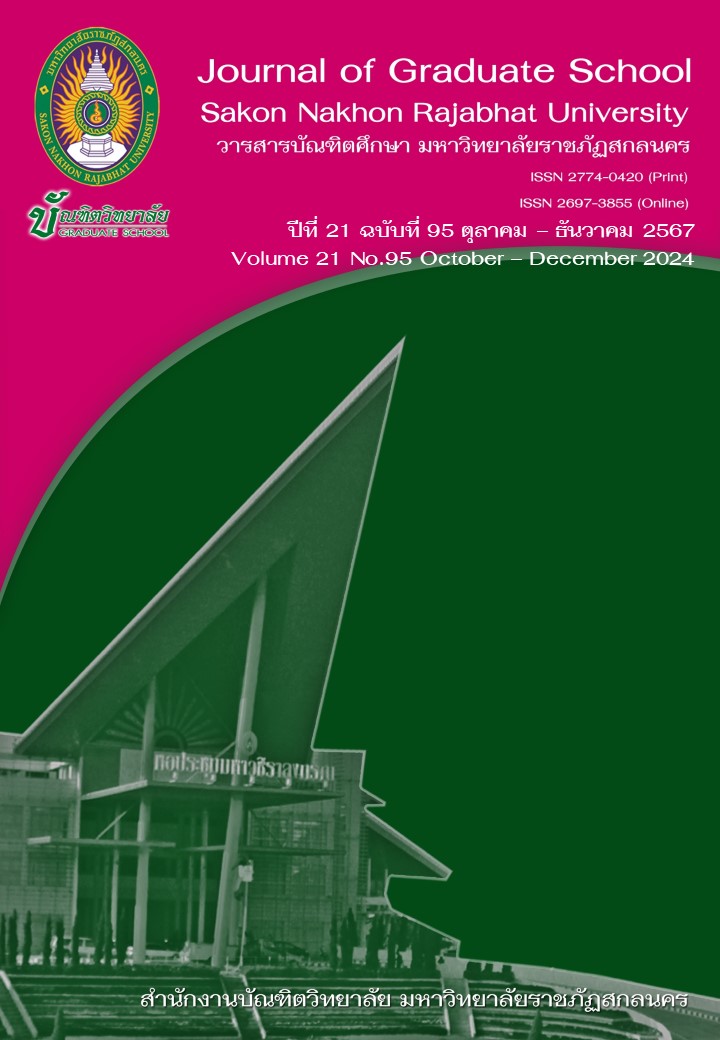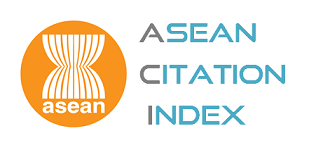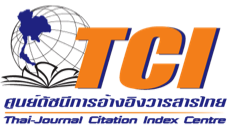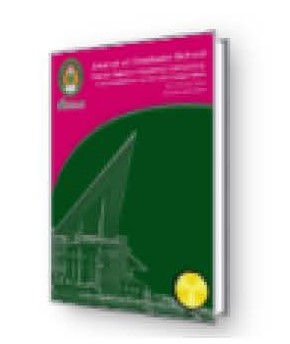NEEDS ASSESSMENT ON THE DEVELOPMENT OF COLLABORATIVE LEADERSHIP OF ADMINISTRATORS IN SCHOOLS UNDER THE SECONDARY EDUCATIONAL SERVICE AREA OFFICE NAKHON PHANOM
Keywords:
Leadership, Collaborative Leadership, Needs Assessment, Development Guidelines, Secondary School AdministratorsAbstract
The purpose of this research was to assess the need for collaborative leadership development of school administrators under the Secondary Educational Service Area Office Nakhon Phanom. The sample, obtained through multi–stage random sampling, comprised 317 participants. The instruments for data collection included a set of 5–rating scale questionnaires assessing current conditions, with the IOC value ranging from 0.80 to 1.00, the discriminative power from 0.51 to 0.91, the reliability of 0.99, and desirable conditions, with the IOC value ranging from 0.80 to 1.00, the discriminative power from 0.32 to 0.74, the reliability of 0.96, and a set of questionnaires assessing guidelines for developing collaborative leadership of school administrators. The statistics for data analysis were frequency, percentage, mean, standard deviation, Modified Priority Need Index (PNImodified), and confirmatory component analysis.
The findings were as follows:
1. The collaborative leadership of administrators in schools under the Secondary Educational Service Area Office Nakhon Phanom consisted of five elements: 1) shared vision, 2) shared decision–making, 3) trust, 4) organizational commitment, and 5) relationship building. These components were rated at the highest level of appropriateness. The model measuring collaborative leadership of school administrators was congruent with the empirical data (𝑥2 = 4.51, df = 3, p–value = 0.21, GFI = 0.99, AGFI = 0.97, RMR = 0.00, RMSEA = 0.04), which had a weight component ranging from 0.87 to 0.98 at the .01 level of significance. The variable with the highest weighted component was trust, followed by relationship building, organizational commitment, shared decision–making, and shared vision, respectively.
2. The current conditions of collaborative leadership of school administrators were overall at a high level, while the expected conditions were overall at the highest level.
3. The assessment results revealed the need for developing collaborative leadership among school administrators in terms of shared decision–making had the Modified Priority Need Index (PNImodified) higher than the overall value (PNImodified = 0.231), followed by relationship building (PNImodified = 0.212), shared vision (PNImodified = 0.195), trust (PNImodified = 0.182), and organizational commitment (PNImodified = 0.153).
4. The guidelines for developing collaborative leadership among school administrators comprised three aspects: 1) shared vision, comprising information and goal–setting, 2) relationship building, including communication skills and empathy skills, and 3) shared vision, encompassing the creation of a shared vision.
References
กนกวรรณ สุ่มพวง. (2558). การวิเคราะห์ความสัมพันธ์ระหว่างภาวะผู้นำแบบร่วมแรงร่วมใจของผู้บริหารสถานศึกษากับการมีส่วนร่วมของชุมชนในการบริหารงานวิชาการของสถานศึกษา สังกัดสำนักงานเขตพื้นที่การศึกษาประถมศึกษาพระนครศรีอยุธยา เขต 1. วิทยานิพนธ์ ค.ม. พระนครศรีอยุธยา: มหาวิทยาลัยราชภัฏพระนครศรีอยุธยา.
จินตนา เบญจมาศ. (2558). ความฉลาดทางอารมณ์และพฤติกรรมการตัดสินใจของผู้บริหารสถานศึกษาขั้นพื้นฐาน สังกัดสำนักงานเขตพื้นที่การศึกษาประถมศึกษาบึงกาฬ. วิทยานิพนธ์ ค.ม. สกลนคร: มหาวิทยาลัยราชภัฏสกลนคร.
ชาลินี โชติจรุง. (2556). การวิเคราะห์เนื้อหาและรูปแบบการสร้างสัมพันธภาพระหว่างผู้หญิงไทยกับผู้ชายต่างชาติบนเว็บไซต์บริการจัดหาคู่. วิทยานิพนธ์ ศศ.ม. เชียงใหม่: มหาวิทยาลัยเชียงใหม่.
ธันยพร บุษปฤกษ์. (2554). การพัฒนาหลักสูตรเสริมสร้างความสามารถในการสร้างสัมพันธภาพระหว่างบุคคล สำหรับนักศึกษาวิศวกรรมศาสตร์ มหาวิทยาลัยเทคโนโลยีราชมงคล. ดุษฎีนิพนธ์ ปร.ด. นครปฐม: มหาวิทยาลัยศิลปากร.
นพรัตน์ ทัดรอง. (2563). โปรแกรมการพัฒนาภาวะผู้นำแบบร่วมมือของผู้บริหารสถานศึกษา สังกัดองค์การบริหารส่วนจังหวัดมหาสารคาม. วารสารสถาบันวิจัยและพัฒนา มหาวิทยาลัยราชภัฏมหาสารคาม, 8(1), 329–346.
บุญไช จันทร์ศรีนา. (2562). การศึกษาภาวะผู้นำแบบร่วมมือรวมพลังของผู้บริหารที่ส่งผลต่อการดำเนินงานของสถานศึกษาขั้นพื้นฐานของภาครัฐ สังกัดกระทรวงศึกษาธิการและกีฬา สาธารณรัฐประชาธิปไตยประชาชนลาว. วารสารมนุษยศาสตร์และสังคมศาสตร์ มหาวิทยาลัยราชภัฏบุรีรัมย์, 17(1), 213–233.
ประภาพร สำเรียงจิตต์. (2558). การพัฒนาโปรแกรมเสริมสร้างภาวะผู้นำแบบรวมพลังของผู้บริหารโรงเรียนประถมศึกษา สังกัดสำนักงานคณะกรรมการการศึกษาขั้นพื้นฐาน. วิทยานิพนธ์ กศ.ด. มหาสารคาม: มหาวิทยาลัยมหาสารคาม.
พระราชบัญญัติการศึกษา (ฉบับที่ 4) พ.ศ. 2562 (1 พฤษภาคม 2562) ราชกิจจานุเบกษา, 136(57ก), 49–52.
ภูเบศว์ บาลชน. (2563). โมเดลภาวะผู้นําของผู้บริหารสถานศึกษาที่ส่งผลต่อการเป็นองค์การนวัตกรรมของ โรงเรียนประถมศึกษาในจังหวัดขอนแก่น: โมเดลแข่งขันภาวะผู้นําการเรียนรู้และภาวะผู้นําแบบร่วมพลัง. วิทยานิพนธ์ ศษ.ม. ขอนแก่น: มหาวิทยาลัยขอนแก่น.
วาโร เพ็งสวัสดิ์. (2551). วิธีวิทยาการวิจัย. กรุงเทพฯ: สุวีริยาสาส์น.
สมัต อาบสุวรรณ. (2556). ตัวบ่งชี้ภาวะผู้นำแบบร่วมพลังของผู้บริหารโรงเรียนประถมศึกษา. วิทยานิพนธ์ ปร.ด. ขอนแก่น: มหาวิทยาลัยขอนแก่น.
สุวิมล ว่องวาณิช. (2562). การประเมินความต้องการจำเป็น. กรุงเทพฯ: จุฬาลงกรณ์มหาวิทยาลัย.
สำนักงานเขตพื้นที่การศึกษามัธยมศึกษานครพนม. (2565). ผลการดำเนินงานการบริหารงานบุคคลประจำปีงบประมาณ 2565. นครพนม: สำนักงานเขตพื้นที่การศึกษามัธยมศึกษานครพนม.
อภิสรา โชติภาภรณ์. (2557). การประเมินความต้องการจำเป็นเพื่อส่งเสริมสมรรถะด้านการเรียนในยุคประชาคมอาเซียนของผู้เรียนโรงเรียนฝึกอาชีพกรุงเทพมหานคร. วิทยานิพนธ์ ศษ.ม. นครปฐม: มหาวิทยาลัยศิลปากร.
Archer, D. & Cameron, A. (2013). Collaborative Leadership: Building Relationships, Handling Conflict and Sharing Control. New York: Routledge Chapman & Hall.
JÄPPINEN, A.K. (2014). Collaborative Educational Leadership: The Emergence of Human Interactional Sense–Making Process as a Complex System. Jyväskylä: University of Jyväskylä (Finland).
JEFFERS, M.P. (2013). Exploring Collaborative Culture and Leadership in Large High Schools. Missouri: The University of Missouri–Columbia.
JGC (2020). Whole Child Education & Collaborative Leadership: Community School Lessons from REACH Academy. Oakland: Reach Academy.
Telford, H. (1996). Transforming Schools Through Collaborative Leadership. London: Falmer Press.
Townsend, T. & MacBeath, J. (2011). International Handbook of Leadership for Learning. New York: Springer.
Downloads
Published
How to Cite
Issue
Section
License
Copyright (c) 2024 Journal of Graduate School Sakon Nakhon Rajabhat University

This work is licensed under a Creative Commons Attribution-NonCommercial-NoDerivatives 4.0 International License.
บทความทุกบทความที่ตีพิมพ์ในวารสารบัณฑิตศึกษา มหาวิทยาลัยราชภัฏสกลนคร ถือว่าเป็นลิขสิทธิ์ของบัณฑิตวิทยาลัย มหาวิทยาลัยราชภัฏสกลนคร










